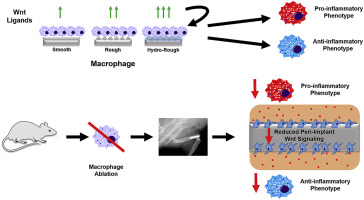当前位置:
X-MOL 学术
›
Biomaterials
›
论文详情
Our official English website, www.x-mol.net, welcomes your
feedback! (Note: you will need to create a separate account there.)
Wnt signaling modulates macrophage polarization and is regulated by biomaterial surface properties.
Biomaterials ( IF 12.8 ) Pub Date : 2020-02-27 , DOI: 10.1016/j.biomaterials.2020.119920 Jefferson O Abaricia 1 , Arth H Shah 1 , Manotri Chaubal 1 , Kelly M Hotchkiss 1 , Rene Olivares-Navarrete 1
Biomaterials ( IF 12.8 ) Pub Date : 2020-02-27 , DOI: 10.1016/j.biomaterials.2020.119920 Jefferson O Abaricia 1 , Arth H Shah 1 , Manotri Chaubal 1 , Kelly M Hotchkiss 1 , Rene Olivares-Navarrete 1
Affiliation

|
Macrophages are among the first cells to interact with biomaterials and ultimately determine their integrative fate. Biomaterial surface characteristics like roughness and hydrophilicity can activate macrophages to an anti-inflammatory phenotype. Wnt signaling, a key cell proliferation and differentiation pathway, has been associated with dysregulated macrophage activity in disease. However, the role Wnt signaling plays in macrophage activation and response to biomaterials is unknown. The aim of this study was to characterize the regulation of Wnt signaling in macrophages during classical pro- and anti-inflammatory polarization and in their response to smooth, rough, and rough-hydrophilic titanium (Ti) surfaces. Peri-implant Wnt signaling in macrophage-ablated (MaFIA) mice instrumented with intramedullary Ti rods was significantly attenuated compared to untreated controls. Wnt ligand mRNA were upregulated in a surface modification-dependent manner in macrophages isolated from the surface of Ti implanted in C57Bl/6 mice. In vitro, Wnt mRNAs were regulated in primary murine bone-marrow-derived macrophages cultured on Ti in a surface modification-dependent manner. When macrophageal Wnt secretion was inhibited, macrophage sensitivity to both physical and biological stimuli was abrogated. Loss of macrophage-derived Wnts also impaired recruitment of mesenchymal stem cells and T-cells to Ti implants in vivo. Finally, inhibition of integrin signaling decreased surface-dependent upregulation of Wnt genes. These results suggest that Wnt signaling regulates macrophage response to biomaterials and that macrophages are an important source of Wnt ligands during inflammation and healing.
中文翻译:

Wnt 信号传导调节巨噬细胞极化并受生物材料表面特性的调节。
巨噬细胞是最早与生物材料相互作用并最终决定其整合命运的细胞之一。生物材料表面特性(如粗糙度和亲水性)可以激活巨噬细胞达到抗炎表型。Wnt 信号传导是一种关键的细胞增殖和分化途径,与疾病中巨噬细胞活性失调有关。然而,Wnt 信号传导在巨噬细胞激活和对生物材料的反应中所起的作用尚不清楚。本研究的目的是表征经典促炎和抗炎极化过程中巨噬细胞 Wnt 信号传导的调节,以及巨噬细胞对光滑、粗糙和粗糙亲水钛 (Ti) 表面的反应。与未治疗的对照组相比,使用髓内 Ti 棒进行巨噬细胞消融 (MaFIA) 小鼠的种植体周围 Wnt 信号显着减弱。在从植入 C57Bl/6 小鼠的 Ti 表面分离的巨噬细胞中,Wnt 配体 mRNA 以表面修饰依赖性方式上调。在体外,Wnt mRNA 在 Ti 上培养的原代小鼠骨髓来源的巨噬细胞中以表面修饰依赖性方式受到调节。当巨噬细胞Wnt分泌受到抑制时,巨噬细胞对物理和生物刺激的敏感性就会被消除。巨噬细胞来源的 Wnt 的缺失也会损害体内间充质干细胞和 T 细胞向 Ti 植入物的募集。最后,整合素信号传导的抑制减少了 Wnt 基因的表面依赖性上调。这些结果表明 Wnt 信号传导调节巨噬细胞对生物材料的反应,并且巨噬细胞是炎症和愈合过程中 Wnt 配体的重要来源。
更新日期:2020-02-28
中文翻译:

Wnt 信号传导调节巨噬细胞极化并受生物材料表面特性的调节。
巨噬细胞是最早与生物材料相互作用并最终决定其整合命运的细胞之一。生物材料表面特性(如粗糙度和亲水性)可以激活巨噬细胞达到抗炎表型。Wnt 信号传导是一种关键的细胞增殖和分化途径,与疾病中巨噬细胞活性失调有关。然而,Wnt 信号传导在巨噬细胞激活和对生物材料的反应中所起的作用尚不清楚。本研究的目的是表征经典促炎和抗炎极化过程中巨噬细胞 Wnt 信号传导的调节,以及巨噬细胞对光滑、粗糙和粗糙亲水钛 (Ti) 表面的反应。与未治疗的对照组相比,使用髓内 Ti 棒进行巨噬细胞消融 (MaFIA) 小鼠的种植体周围 Wnt 信号显着减弱。在从植入 C57Bl/6 小鼠的 Ti 表面分离的巨噬细胞中,Wnt 配体 mRNA 以表面修饰依赖性方式上调。在体外,Wnt mRNA 在 Ti 上培养的原代小鼠骨髓来源的巨噬细胞中以表面修饰依赖性方式受到调节。当巨噬细胞Wnt分泌受到抑制时,巨噬细胞对物理和生物刺激的敏感性就会被消除。巨噬细胞来源的 Wnt 的缺失也会损害体内间充质干细胞和 T 细胞向 Ti 植入物的募集。最后,整合素信号传导的抑制减少了 Wnt 基因的表面依赖性上调。这些结果表明 Wnt 信号传导调节巨噬细胞对生物材料的反应,并且巨噬细胞是炎症和愈合过程中 Wnt 配体的重要来源。











































 京公网安备 11010802027423号
京公网安备 11010802027423号